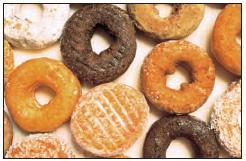London, UK—A study published late last year in the British Journal of Psychiatry reveals a clear dietary influence on the incidence of depression. The statistics show a correlation between a processed and junk food-based diet and the presence of depressive symptoms in an individual. The analysis is based on a sample of 3,486 men and women of an average age of 55.
The statistics also show that a diet based on healthy, whole foods has the opposite effect. The study, entitled “Dietary Pattern and Depressive Symptoms in Middle Age,” gave the participants a questionnaire about their eating habits, the results of which placed them on a scale ranging from a primarily whole food diet to one heavy in processed foods. These were compared with a brief psychological assessment taken five years after the diet report. Individuals who, five years previously, reported a diet consisting primarily of whole food (characterized by vegetables, fruits and fish), were found to have few mood problems or signs of depression.
Those who reported a diet full of processed foods (such as sweetened desserts, fried food, processed meat, refined grains and high-fat dairy products) were more likely to report symptoms of depression in the corresponding psychological assessment. “People who are depressed are less likely to make quality meals, (but) even if people are more likely to eat junk foods after being depressed, they are likely to sustain the depression because these foods do not provide what I call neuronutrients,” says Jack Challem, author of The Food-Mood Solution. Challem says that junk foods are usually devoid of nutrients important for brain function, like B-complex vitamins and omega-3 fish oils.
The other finding emphasized by the study was the apparent protection healthy food affords against depression. Results showed that participants whose intakes were most dominated by the whole food diet pattern were even less likely to be depressed than those who were more moderate in their whole food intake.

The strength of the statistical disparities allowed the researchers to draw equally strong conclusions about these correlations. Adjusting for other factors in a healthy lifestyle, such as smoking and level of physical activity, they believe they have established that junk-food laden diets are a strong indicator of depression, while whole food diets result in a lower risk, and may even help prevent the onset of depression. Researchers represented the Department of Epidemiology and Public Health, at University College in London, and the National Institute of Health and Medical Research at University of Montpellier in France.
Published in WholeFoods Magazine, March 2010










